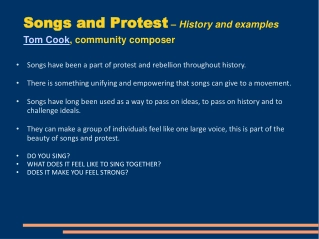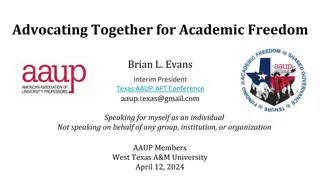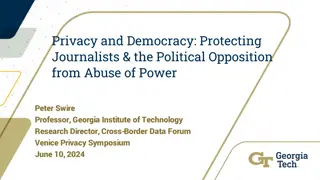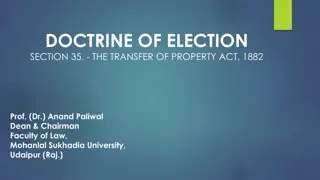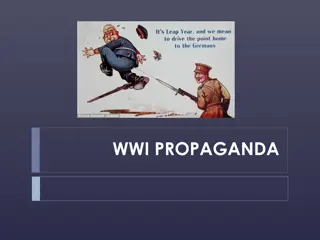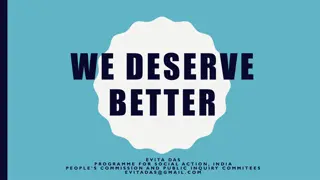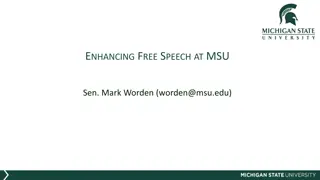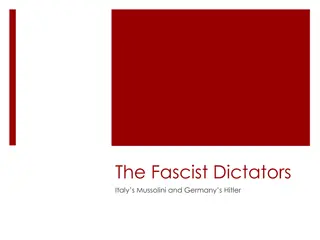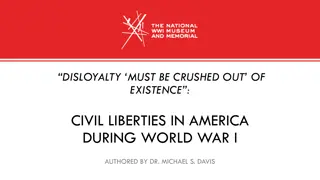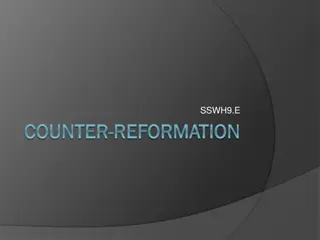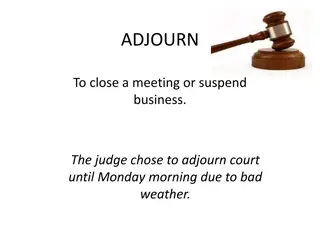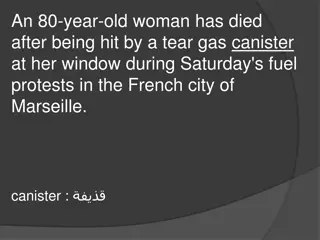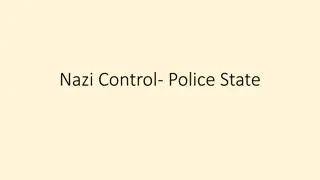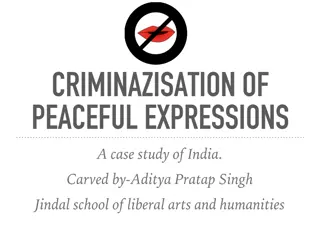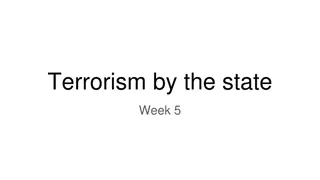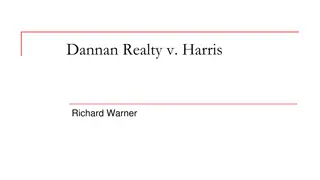Songs and Protest
Explore the deep-rooted connection between songs and protest throughout English history. From the traditional rebel song "The Cutty Wren" depicting the Peasants' Revolt in 1381 to the revolutionary actions of "The Diggers" in 1649, these songs have served as powerful tools for conveying dissent, cha
3 views • 12 slides
Advocating Together for Academic Freedom - Importance and Principles
Advocating for academic freedom is crucial for the advancement of knowledge and quality education. The American Association of University Professors (AAUP) champions academic freedom, shared governance, and economic security for faculty members. The 1940 Joint AAUP/AAC&U Statement of Principles on A
4 views • 14 slides
Advocating Together for Academic Freedom in Higher Education
Advocating for academic freedom and shared governance in higher education, the American Association of University Professors (AAUP) upholds principles of free inquiry, expression, and dissent. Joining AAUP allows faculty members to champion for economic security and quality education, supported by s
1 views • 10 slides
Privacy and Democracy: Safeguarding Journalists and Political Opposition
Panel discussion on the importance of privacy as a structural safeguard for democracy, emphasizing protections against abuse of power by temporary leaders. Focus on special privacy measures for political opposition and journalists to uphold free speech and dissent. Historical context and future cons
1 views • 13 slides
Doctrine of Election under Section 35 of the Transfer of Property Act, 1882
The doctrine of election under Section 35 of the Transfer of Property Act, 1882 deals with situations where a person professes to transfer property he does not own, and the owner must elect to confirm or dissent. If the transfer is gratuitous and the transferor is unable to make a fresh transfer, th
5 views • 17 slides
Understanding Wartime Propaganda in WWI
Wartime propaganda during WWI was employed for various purposes such as recruiting soldiers, financing the war effort, and unifying the country. It used tools like demonization, emotional appeals, patriotic appeals, and half-truths to sway public opinion and support the war. An in-depth analysis of
0 views • 7 slides
Advocating for Social Action and Justice in India
Advocating for social action and justice is crucial in India, where various issues such as accountability, truth, and justice, as well as dissent, inequality, and oppression, are prevalent. The call for accountability is highlighted through the need for public inquiries and commissions to investigat
0 views • 12 slides
Ensuring Free Speech Rights at Michigan State University
Michigan State University's Trustees emphasize the importance of protecting free speech on campus. The university's philosophy supports campus dissent, promoting a healthy exchange of ideas. Recent incidents, like protesters disrupting a speaker's event, raise concerns about safeguarding free speech
0 views • 11 slides
The Era of Vargas and the Estado Novo (1930-1945)
Getúlio Vargas's rise to power in 1930, the challenges he faced, his adept political maneuvering, and the consolidation of his authority marked a transformative period in Brazilian history. Vargas's regime navigated through economic crises, political dissent, and regional rivalries, shaping Brazil'
0 views • 20 slides
The Rise of Fascism in Italy: The Reign of Mussolini
Italy's post-World War 1 chaos paved the way for Mussolini's rise to power as a dictator. Using violence and intimidation, the Fascists dismantled democracy, centralized power, and promoted extreme nationalism and militarism. Despite promises of order and greatness, Mussolini's regime suppressed dis
0 views • 22 slides
The Red Scare and McCarthyism: Cold War Repression in America
The Red Scare and McCarthyism were periods of intense anti-communist hysteria in the United States during the Cold War. The fear of communism led to government policies that restricted dissent, fueled by figures like Senator Joseph McCarthy who made unfair allegations and targeted various groups. Th
0 views • 13 slides
Civil Liberties and Dissent in America: World War I and Beyond
Civil liberties in America during World War I were challenged as state and local governments suppressed anti-war sentiments, leading to the transformation of the Justice Department to counter-subversive actions. Organizations like the NCLB fought for freedom of expression, culminating in the creatio
0 views • 36 slides
Reformation and Counter-Reformation in the Catholic Church
Catholic rules during the Middle Ages granted immense power to the Pope, sparking dissent that led to the Protestant Reformation. The Counter-Reformation was the Catholic response to Protestant criticisms, leading to the Council of Trent in the mid-16th century to reaffirm Catholic doctrines and pra
0 views • 14 slides
Enhancing Your Vocabulary: Legal Terminology Explained
This content provides explanations and examples of legal terms such as "adjourn," "censure," "dissent," "exonerate," "extemporaneous," and "extricate," illustrated with vivid imagery. Learn how these terms are used in various contexts to deepen your understanding of legal jargon.
0 views • 10 slides
Protests in Marseille Turn Deadly: 80-Year-Old Woman Killed by Tear Gas Canister
An 80-year-old woman died in Marseille after being hit by a tear gas canister during fuel protests. The protests, initially against fuel tax, have escalated into wider discontent over living costs. The woman was hit in the face at her window, succumbing to injuries despite hospitalization. The movem
0 views • 20 slides
Nazi Control in Germany: The Dark Reign of the Police State
The Nazis implemented a strict regime of control in Germany through censorship, propaganda, and the establishment of a powerful police state. They used organizations like the SS, Gestapo, and SD to suppress dissent, monitor the population, and silence opposition. The legal system was manipulated to
0 views • 8 slides
Criminazisation of Peaceful Expressions: A Case Study of India
Indian governments use laws like sedition and defamation to stifle dissent, despite PM Modi's call for free speech. The sedition law, a colonial-era relic, is used against activists and critics, with vague language allowing misuse. Famous cases, including the arrest of Kanhaiya Kumar, highlight the
0 views • 13 slides
Understanding State Terrorism and Its Implications on Society
State terrorism, employed by governments or factions within them, poses a grave threat to citizens and international peace. This form of terrorism includes intimidation, coerced conversion, and genocide as tools to maintain control. Dictators find it easier to carry out state terrorism in secret, of
0 views • 7 slides
Analysis of Entire Agreement Clause in Fraud Cases
The case of Dannan Realty v. Harris Richard Warner examines the impact of an entire agreement clause on a fraud cause of action. The majority opinion highlights that the specific language of the clause, stating the buyer is not relying on any representations outside the written contract, barred the
1 views • 6 slides
